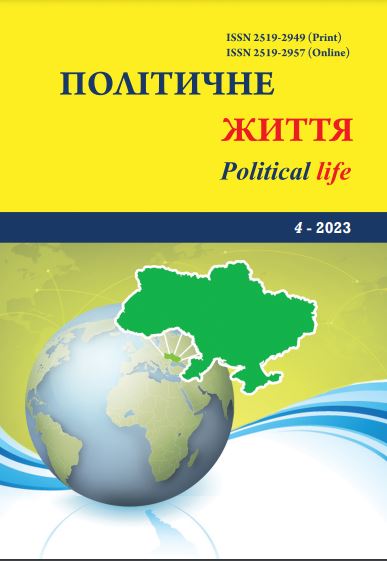Interaction between the government and parliamentary opposition in Visegrad Group countries: institutional aspect
DOI:
https://doi.org/10.31558/2519-2949.2023.4.1Keywords:
government; parliamentary opposition; parliament; political systems; political party; political actors; Visegrad Group; politics; political relationsAbstract
On the basis of the collected empirical and theoretical materials, a cross-regional analysis was carried out and conceptual approaches were developed to explain the institutional mechanisms of interaction between the government and the parliamentary opposition in the countries of the Visegrad Group. The institutional framework in which the parliamentary opposition functions and how effective its influence on the government in each of the countries can be is studied. It is argued that the parliamentary opposition in the countries of the Visegrad Group remains an important element of influence on the balance of power between the President, the government and the Parliament. This influence may increase depending on the size of the parliamentary opposition, the emergence of coalitions, the weakening of the parliamentary majority, the intensification of the conflict between the government and the President, trends in the government’s use of anti-democratic methods and means of exercising power.
In Poland, the Czech Republic, Slovakia and Hungary, the dichotomy between pro-government and opposition parties is quite pronounced. This is due to the significant level of competition in the party environment, as well as the fact that the government is mainly formed from the environment of the parliamentary majority.
It was determined that the parliamentary opposition in the countries of the Visegrad Group can influence the activities of the government through various channels. The main among them are political control over the cabinet through a vote of confidence (no confidence) and question hour to the government; influencing the content of government bills through participation in the legislative process and through the activities of representatives in parliamentary committees; controlling the legality of government policies through the Constitutional Court or initiating referendums. The analysis of formal powers and their use by the opposition as a tool to influence the government made it possible to identify similarities and differences in each of the countries.
It has been proven that in practice it is difficult for the parliamentary opposition to use its institutional opportunities to influence the government due to the fact that the ruling majority has greater access to power resources and there are constitutional provisions that minimize the change of power in order to preserve political stability.
References
Ilov I. Konstytutsiini zminy v Uhorshchyni 2012 roku: osnovni novatsii ta yikh vplyv na suspilno-politychnyi rozvytok derzhavy. Viche. 2013. № 4. S. 11-152.
Klymonchuk V. Peredumovy ta instytutsionalizatsiia vzaiemovidnosyn vlady ta opozytsii v krainakh Tsentralno-Skhidnoi Yevropy (na prykladi krain Vyshehradskoi hrupy): dosvid dlia Ukrainy. Politychne zhyttia. 2020. №2. S. 12-18. DOI: 10.31558/2519-2949.2020.2.2.
Kliuchkovych A., Haidanka Ye., Maradyk N. Transformatsiia systemy vladnykh instytutiv. Evoliutsiia partiinykh system krain Vyshehradskoi chetvirky: dosvid dlia Ukrainy. Uzhhorod: Tsentr informatsiino-vydavnychoi diialnosti ZIPPO. 2014. S. 47-78.
Pshevorskyi A. Perekhody do demokratii: liberalizatsiia ta demokratyzatsiia. Demokratiia: antolohiia / Uporiad. O. Protsenko. Kyiv: Smoloskyp, 2005. S. 605-648.
Soroka S. Mekhanizmy vzaiemodii uriadu i parlamentu v protsesi derzhavnoho upravlinnia: dosvid krain Yevropeiskoho Soiuzu ta ukrainska praktyka. Mykolaiv: Vydavnytstvo ChDU imeni Petra Mohyly, 2012. 421 s. 6. Andeweg R., Nijzink L. Beyond the Two Body Image: Relations between Ministers and MPs’. Parliaments and Majority Rule in Western Europe. Frankfurt : Campus Verlag, 1995. P. 152-178.
Andeweg R., Nijzink L. Beyond the Two Body Image: Relations between Ministers and MPs’. Parliaments and Majority Rule in Western Europe. Frankfurt : Campus Verlag, 1995. P. 152-178.
Ilonszki G., Kurtan S. European Journal of Political Research. 2005. Vol. 44, Issue 7-8. P. 1033-1040.
King A. Modes of Executive-Legislative Relations: Great Britain, France, and West Germany. Legislative Studies Quarterly. 1976. Vol. 1. No.1. P. 11-36.
Kopecky P., Spirova M. Parliamentary Opposition in Post-Communist Democracies: Power of the Powerless. Journal of Legislative Studies. 2008. Vol. 14. No. 1/2 . P. 133-159.
Linek L., Manseldová Z. The Parliament of the Czech Republic, 1993-2004. Journal of Legislative Studies. 2007. Vol. 13, No 1. P. 12-37.
Marušiak J. The political system in the Slovak Repablik. Political Systems of Visegrad Group Countries / editor W. Gizicki. Trnava-Lublin, 2012. P. 107-148.
Mojak R. Parlament a rząd w ustroju Trzeciej Rzeczypospolitej Polskiej / R. Mojak. Lublin: Wydawnictwo Uniwersytetu Marii Curie-Skłodowskiej, 2007. 664 s.
O’Donell G. Delegative Democracy. Journal of Democracy. 1994. Vol. 5. No 1. P. 55-69.
Schӧpflin G. Hungary: Country without Consequences. OpenDemocracy. 2006. 22 Sept. URL: http://193.41.101.59/debates/article.jsp?idј3&debateIdј33&articleIdј3926 (дата звернення: 27.05.2022).
The Fundamental Law of Hungary (25 April 2011). URL: http://www.kormany.hu/download/e/02/00000/ The%20New%20 Fundamental%20 Law%20of%20Hungary.pdf (дата звернення: 27.05.2022).

